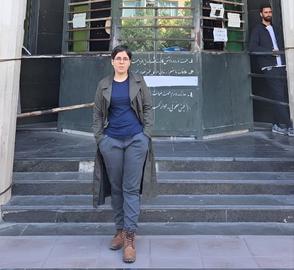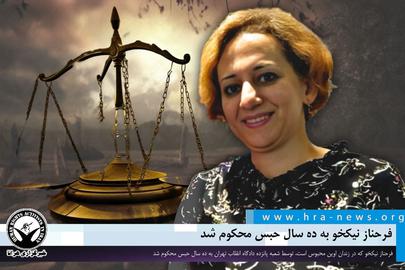While the Islamic Republic grapples with a looming war, Supreme Leader Ali Khamenei has emphasized the enforcement of hijab regulations in two consecutive speeches.
The notorious Morality Police resumed their presence with full intensity on the streets Saturday.
The police command in Iran's capital announced that beginning Saturday there will be heightened enforcement of mandatory hijab laws, warning Iranian women and girls of legal repercussions if they fail to comply.
Simultaneously, the Police Command in Bushehr issued a statement declaring a more rigorous implementation of the hijab policy on all roads and public spaces starting April 13.
The statement emphasized that police officers will take legal measures against those who violate hijab and decency laws as part of their duty.
These warnings come in the wake of Ali Khamenei's address on April 3 where he extensively discussed women's civil disobedience, labeling opposition to the mandatory hijab as a "foreign agenda" and urging authorities to take "legal and Shariah measures."
Following Khamenei's directives, numerous officials of the Islamic Republic have echoed similar sentiments.
This pattern has become routine, with the leader issuing instructions through speeches and officials promptly aligning with his directives to avoid lagging behind.
Brigadier General Mohammad Bagher Ghalibaf, the Parliament spokesman, expressed concern over "indecencies and norm violations" related to hijab, while Mohammad Aghamiri, a Tehran city council member, proposed employing military forces to address "improper hijab."
Gholam-Hossein Mohseni-Eje'i, the head of the judiciary, acknowledged the "inadequacy" of the country's efforts in upholding "chastity and hijab standards."
Since the death in custody of Mahsa Amini in September 2022 and subsequent nationwide protests, this marks the second instance where law enforcement officials have announced an escalation in pressure on women engaging in civil disobedience against mandatory hijab regulations, stating it will start "from Saturday."
Last year, during these same days, Ahmadreza Radan, Commander-in-Chief of Iran's police, issued a warning to women that starting "from Saturday," individuals not adhering to mandatory hijab norms would be identified through "error-free and intelligent" methods and dealt with accordingly.
Simultaneously, women protested Radan's actions by sharing images of their resistance to mandatory hijab under the hashtag "Az Shanbeh," "from Saturday" in Persian.
Throughout the past year, numerous reports have surfaced regarding the confiscation of vehicles, issuance of hijab-related warnings, summoning of non-compliant women, and instances of harassment in public places by hijab enforcement officers.
Despite these measures, women persist in refusing to wear the obligatory hijab.
Some believe that those resisting mandatory hijab are also rejecting broader policies they oppose, potentially escalating tensions between Iran and Israel.
Analysis of Iran's recent history reveals a pattern wherein the government relies on repression and increased societal pressure during periods of heightened security challenges.
Some view the reintroduction of guidance patrols as a form of stubborn retaliation against society.
Saeed Pahandi, a sociologist and professor at the University of Lorraine in France, asserts that Iranian officials wrongly attribute civil disobedience against mandatory hijab and religious laws to foreign influences.
He suggests that during periods of regional tension or crises involving countries like Israel or the United States, the government exploits these situations to suppress dissent by imposing stricter hijab enforcement or other measures, under the pretext of combating foreign interference.
In the Islamic Republic, it's common practice to label protesters or critics as "enemies" of the state.
Pahandi argues that since the start of the Woman, Life, Freedom movement and the surge in defiance of mandatory hijab laws, the government has sought to suppress and contain this movement through various measures and strategies.
Pahandi said, "Iranian society, and public sentiment, for the most part, reject the mandatory hijab policy. The latest survey, commissioned by the Ministry of Guidance and conducted internally, reveals that approximately two-thirds of Iranian society opposes mandatory hijab regulations."
He added: "This cultural shift holds significant meaning, reflecting broader societal changes and the profound cultural impact of the Woman, Life, Freedom movement."
He underscores that while the government may garner support for policies such as mandatory hijab through manipulated parliamentary representation, this type of legitimacy lacks credibility within society and lacks moral standing.
Pahandi said, "We've seen this scenario unfold over the past two years. Despite discussions and attempts to enforce hijab compliance through measures like deploying hijab enforcement officers, confiscating vehicles, and imposing fines as deterrents, none have proven effective."
According to Pahandi, the persistence of societal defiance against oppressive laws despite coercive measures demonstrates the depth and credibility of this movement within Iranian public opinion.
"Repressive tactics have proven ineffective," he said.
visit the accountability section
In this section of Iran Wire, you can contact the officials and launch your campaign for various problems



























comments